Artists pay homage to Oscar Wilde in Paris hotel where he died
PARIS

Contemporary artists are paying tribute to writer Oscar Wilde with a series of works displayed in the Paris hotel where he died at only 46.
After a glittering career as one of the greatest playwrights and all-round wits of the 19th century, Wilde (1854-1900) fell into poverty and disgrace after being persecuted - and imprisoned - for his homosexuality.
His last days were spent in a humble hotel on the Left Bank called, simply, L'Hotel.
These days it is a five-star establishment graced by celebrities, and this week has been adorned with artworks related to Wilde, brought together by curator Daniel Malarkey.
In the very room where Wilde died - number 16-- hangs a portrait of him on his death-bed by British artist Maggi Hambling, whose famous statue of the Irishman sits close to Trafalgar Square in London.
"It's a moment when he's getting close to death and famously says 'Either the wallpaper has to go or I do, I fear it shall be me,'" Malarkey told AFP.
The gaudy wallpaper that horrified Wilde has long since been replaced, but Malarkey said something of Wilde's presence still remains.
"Maggi was thrilled to put the portrait back in the room where the scene takes place," he said.
Among the other pieces in the show, which has a short run until Oct 22, is one by late filmmaker and gay activist Derek Jarman, a portrait of Tilda Swinton taken in the same hotel by Katerina Jebb, and two wooden sculptures by Eleanor Lakelin made from a tree outside Reading prison where Wilde was an inmate between 1895 and 1897.
It is titled "De Profundis" after Wilde's final work, a long letter in which he recalls his love for the young Lord Alfred Douglas that led to his downfall, and reflects on art and life - "one of the greatest works of literature in history... everyone should read it," said Malarkey.
"He was very unhappy here, but in 'De Profundis' he's trying to return to a sense of spirituality - he's looking at his life and realizing his mistakes," he added.
"With these works I'm trying to give him some of that mysticism that he craved."
















